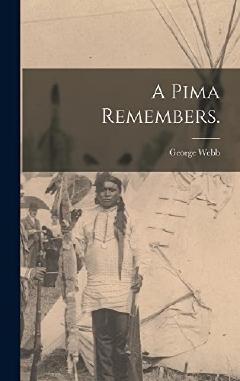
- Title
- A Pima Remembers
- Author
- George Webb
- Format
After reading Where the Red-Winged Blackbirds Sing I moved straight into this intimate personal narrative of George Webb, an Akimel O’odham Indian who was born to a thriving agrarian community under intense colonial threat, and who lived to see the space age.
(According to his story, Webb’s given name as a child was Buzzing Feather but he calls himself by his Christian name, George Webb, and I will use that name here.)
Webb’s writing is simple, bare, and frank. He tells us exactly what he wants to say, in the simple language of a grandfather recounting his life to his grandchildren. It gives the book an intense realness and authenticity that I found powerful. It made every word feel important so that I was engrossed as I read it straight through.
I enjoyed his brief retellings of Pima myths, especially the enchanting and strange story of White Clay Eater. And I also was moved by his concluding chapters. Webb is in a unique position, fully integrated into western society, but with a lived memory of a totally different world. A world the disintegration of which he himself witnessed. He tackles this in the end, where he gets as close to biting as you’ll find in this otherwise gentle story.
Today the Pima Indian is doing his best to get along under the white man’s conditions, striving to make a living any way he can. He may live in a good home, drive a nice car, and can go into a bar when he wants to have a drink.
Like the white man, he can drink too much and run into an accident on the highway and get himself killed. Like the white man, he sometimes has to worry about the money to make a payment on his television set. Sometimes he plays around and his home life is broken up. Yes, the Pima Indian is getting civilized.
[…]
When somebody asks me: “How would you rather live, the old Indian way or the white way?” I say: “The old Indian way.”
He goes on to illustrate the change he’s seen with haunting and beautiful imagery:
The red-wing blackbirds would sing in the trees and fly down to look for bugs along the ditches. Their song always means that there is water close by as they will not sing if there is not water splashing somewhere.
The green of those Pima fields spread along the river for many miles in the old days when there was plenty of water.
Now the river is an empty bed full of sand.
Now you can stand in that same place and see the wind tearing pieces of bark off the cottonwood trees along the dry ditches.
The dead trees stand there like white bones. The red-wing blackbirds have gone somewhere else.
I loved every page of this book.
